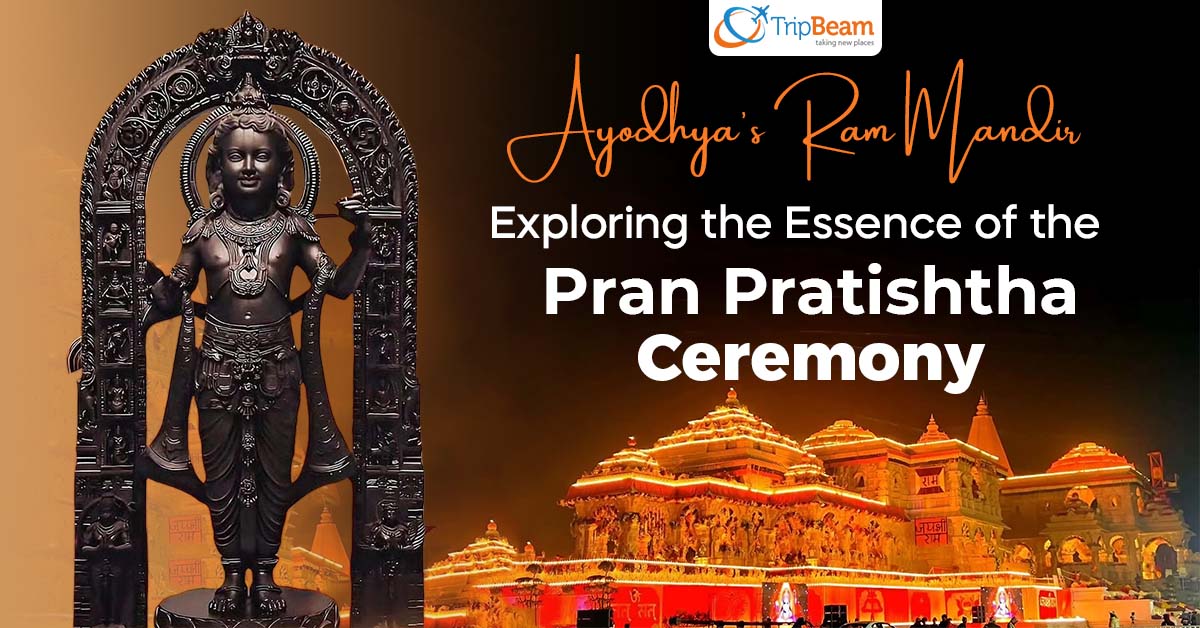

Today, January 22, marks the completion of the pran pratishtha process for the idol at the Ram temple in Ayodhya, which commenced on January 16 with a series of ceremonies.
Giving life to the idol is the primary goal of pran pratishtha, a very basic ceremony that consists of multiple procedures with symbolic meanings drawn from the Vedas and Puras.
So, what precisely is pran pratishtha, and how is it carried out? How is prana, or life, given to the worshipped by the worshipper? The explanations lie in the Hindu worldview’s connection of the divine and the devotee, and the importance of nature in many Hindu ceremonies. Thus, in today’s article, we’ll discuss Ayodhya’s Ram Mandir and the significance of the Pran Pratishtha Ceremony. Also, you can visit Tripbeam to book cheap tickets to India from Canada. Let’s dive in.
Pran pratishtha, a revered Hindu ceremonial, is particularly significant since it involves calling upon an idol of a god to bestow onto it a holy or heavenly attribute. “Pran” signifies life, while “pratishtha” denotes an institution.
Therefore, pran pratishtha could be understood as the “bringing the deity to life” or the “establishment of the life force”. Following the completion of the pran pratishtha rite, the lifeless idol undergoes a profound metamorphosis that changes it into a living embodiment of the god.
Through this metamorphosis, the idol gains the capacity to hear prayers and grant favors to worshippers who ask for divine intervention.
Pran pratishtha is thought to have long-lasting effects since the idol is claimed to hold the divine presence for all eternity after the ceremony is performed.
This continuity creates a sense of continuity in the sacred area by highlighting the spiritual holiness and eternal bond formed between the worshippers and the consecrated deity. Also, you can visit our official website Tripbeam to book cheap flights from Kelowna to India.
The primary goal of the ceremony is to give life to the idol, but each step of the procedure has a distinct significance.
Shobha Yatra: The parade through the neighborhood surrounding the shrine showcases the idol. Believers hold the conviction that welcoming onlookers transfer their reverence to the idol. It’s the initial step in transforming the idol into a god.
Rituals at Mandap: At the mandap, the priest utters a prayer to awaken the idol and ensure that it prepares to surrender life if damaged. This rite ensures a smooth transfer of life from the injured idol to a new one if needed.
Adivas: In the ‘adivas’ rite, participants immerse the idol in grain and water. It serves two purposes: detecting flaws or inferior materials and healing wounds during the construction process.
Ritual Bath and ‘Abhishek’: Following ‘adivas,’ the idols undergo a sacred bath that includes not only water but also scented flower essence, cow horn water, sugar cane juice, etc.
Opening the Deity’s Eyes: During this ritual, the worshippers open the deity’s eyes by applying kohl around them with a gold needle. They perform this process from behind because they believe that looking straight into the eyes of the holy could be overwhelming.
On January 22, 2024, they are scheduling the holy ritual of Pran Pratishtha to take place. The dedication of Ram Lalla’s temple will precisely occur between 12:15 and 12:45 p.m.
The infusion of heavenly energy into the idol at this critical juncture denotes the temple’s spiritual significance and holiness. The fervent anticipation and participation of devotees within this precise time frame increase the blessing of the Ram temple. In addition, don’t forget to check out Tripbeam.com to get affordable flight tickets from the USA to India.
On the auspicious day of the pran pratishtha ritual, the priests perform a protracted ceremonial procedure on the idol before installing it in the temple.
Before this event, priests immerse the deity in a mixture of grain and water, denoting a period of cleansing. They ceremoniously bathe the idol in milk and cover it with numerous scents, representing consecration and purity when it arrives at the temple.
After this ceremony, the organizers place the idol with great care, facing eastward in a certain direction. According to Hindu tradition, facing east, where the sun rises, attracts positive energy, therefore this direction choice makes sense.
The priests commence a holy recital of prayers, incantations, and rites once it is securely in its designated place.
The worshipers believe that by invoking these divine rituals and performing ceremonial deeds, they cause the idol to undergo a metamorphosis, gaining a spiritual energy that signifies its embodiment of the divine.
At that point, authorities declare it suitable for worship, and devotees gather there to offer their prayers and show their respect.
This process highlights the holiness of the pran pratishtha ceremony by forging a deep relationship between the worshipper and the deity.
Thus, book your flights from Thunder Bay Ontario to India with Tripbeam and immerse in the spiritual essence of Ayodhya’s Ram Mandir.
Also Read: Indulge in the splendor of these top festivals of India
Tell us more details to help better






| Sun | Mon | Tue | Wed | Thu | Fri | Sat |
|---|---|---|---|---|---|---|
30 | 31 | 1 | 2 | 3 | 4 | 5 |
6 | 7 | 8 | 9 | 10 | 11 | 12 |
13 | 14 | 15 | 16 | 17 | 18 | 19 |
20 | 21 | 22 | 23 | 24 | 25 | 26 |
27 | 28 | 29 | 30 | 1 | 2 | 3 |
| Sun | Mon | Tue | Wed | Thu | Fri | Sat |
|---|---|---|---|---|---|---|
30 | 31 | 1 | 2 | 3 | 4 | 5 |
6 | 7 | 8 | 9 | 10 | 11 | 12 |
13 | 14 | 15 | 16 | 17 | 18 | 19 |
20 | 21 | 22 | 23 | 24 | 25 | 26 |
27 | 28 | 29 | 30 | 1 | 2 | 3 |